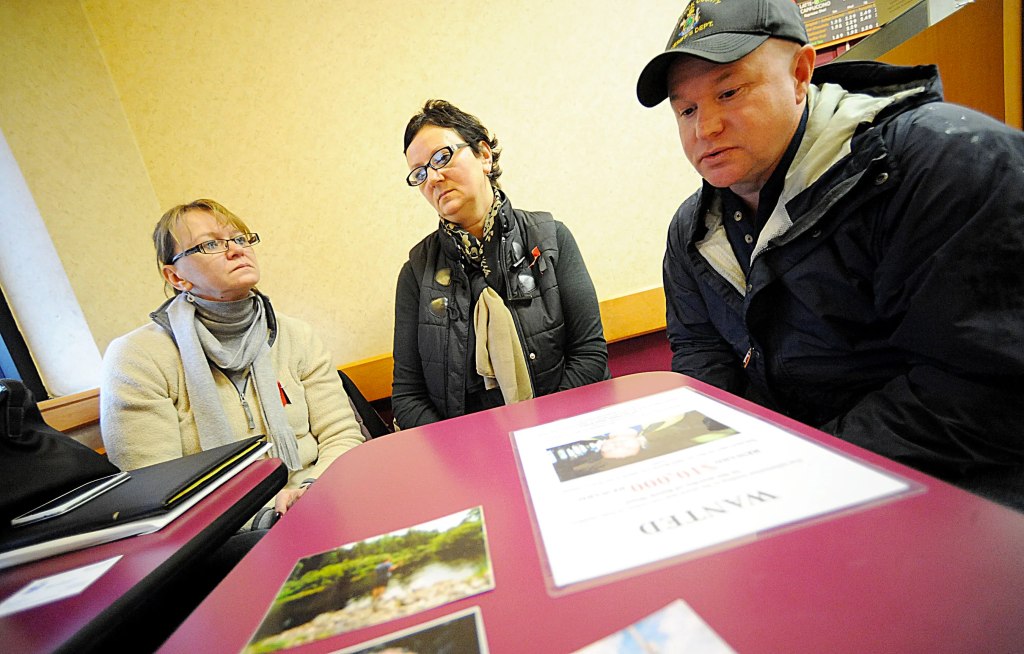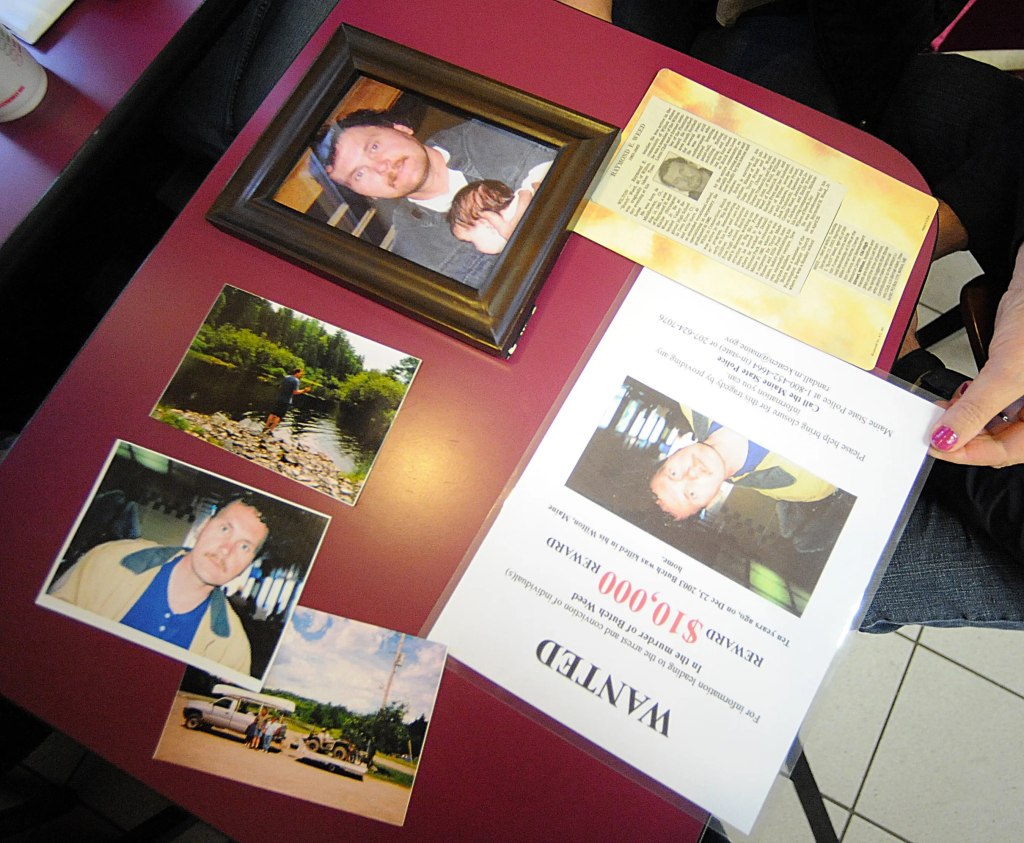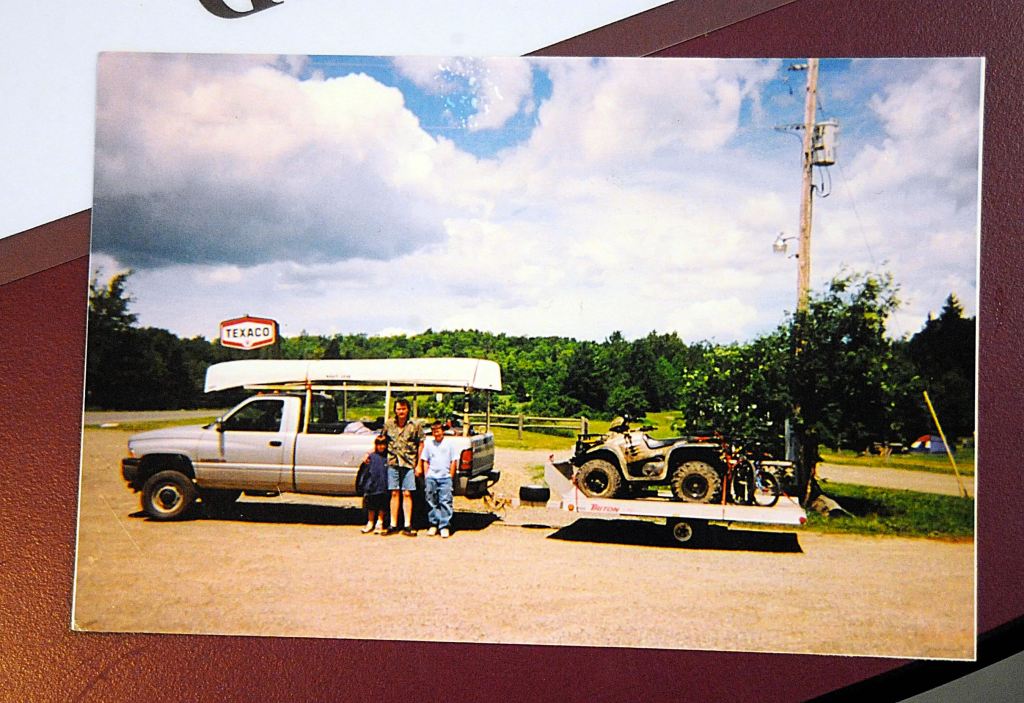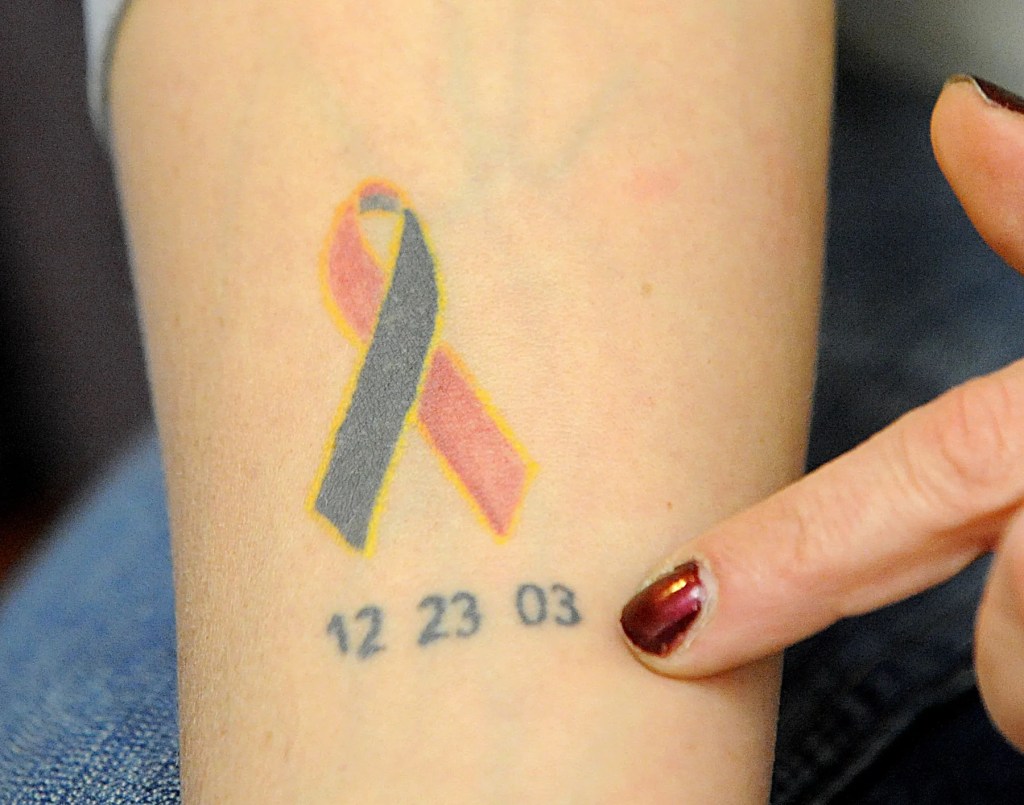WILTON — Rachel Skidgell rubs her left hand over a tattoo of a red and black ribbon on her right arm. It is something she does every day.
The tattoo is a constant reminder of her brother, Raymond “Butch“ Weed, who was killed 10 years ago. His killer is still at large.
The 40-year-old Weed was shot twice while sitting at his desk in his home office on Dec. 23, 2003. Friends delivering Christmas gifts found the body of the contractor at about 7 p.m. He is believed to have died between 5:30 and 7 p.m.
He operated his business, New Horizon Builders, from his home at 32 Main St.
“It is still painful,” said Skidgell, of Carthage. “It is still incredibly painful. There is no closure. We will never give up hope. We will constantly be working toward getting this resolved, and the answers that everybody needs — the community and ourselves. It is the same for all of us. Butch deserved to have the answers.”
Skidgell and her sister, Terry Campbell of Franklin, and her husband, Shane Campbell, put up posters around the area on Dec. 6 to announce a $10,000 reward for information leading to the arrest and conviction of their brother’s killer. The posters feature the same photo of Weed, with his intense blue eyes, that appeared on previous reward posters.
Skidgell and Terry Campbell said they think of Butch and miss him every day, as does the rest of the family.
They are holding a candlelight vigil in his memory at 5 p.m. Monday, Dec. 23, at the Veterans Memorial on Main Street in downtown Wilton.
Campbell said she is angry that the killer remains free.
“I assume the person who did this has zero conscience, and while I think about it every day, they probably don’t think about it,” she said.
To her, the pain is so fresh, it’s like he was shot yesterday, Campbell said.
It has made the family more aware that this could be the last time they speak or see each other.
“I love you” is said more often to family members, she said.
“We feel the person who did this still lives in the area,” said Shane Campbell, a police officer.
They also feel “Butchy” knew the person who shot him.
The person is someone he would have allowed into his house, Campbell said.
He was strong and capable, and for him to be sitting in his own house and not to have thrown the table at the person, tells them that he knew the killer, Campbell said.
“We want the person to know they will be found guilty, and they will be held responsible for what they did,” Campbell said. “I would like to think that this person has lived 10 years with the guilt, and it is finally time to come forward and admit what they did.”
It is time for the community to feel safe again, Skidgell said.
The killer could be behind them in the local grocery store or walking past them at the post office or could be their neighbor, she said.
“We will find the person,” Terry Campbell said.
Police Chief Heidi Wilcox said the death of Butch Weed “left its mark on the town of Wilton.” She is the fourth chief since the killing.
“All these years later, people in the community still regularly comment how they will never really feel safe until the killer is caught,” Wilcox said. “I know there are people in and from this community who have information about this homicide. These people held back on giving this information at the time for any number of reasons, from thinking it was not consequential to not trusting law enforcement working around the case.”
She hopes they will share any and all information with Maine State Police Detective Randall Keaten of the Major Crimes Unit, who has recently been assigned to the cold case.
Wilcox said she has complete faith in Keaten’s investigative skills. She credits him for being instrumental in solving a number of local cases, and has told him Wilton police will help in any way they can.
Family members recently met with Keaten and his supervisor, Detective Sgt. Mark Holmquist of the Major Crimes Unit.
“We are much closer than we were 10 years ago,” Skidgell said. “We have a lot of hope with Randy. They are using new technology with old evidence, so we’re really hoping we get this resolved.”
Some of the new technology could determine the height of the shooter, she said.
There hasn’t been a whole lot going on in the case, but it is still an open and active investigation, said state police Lt. Brian McDonough of the Major Crimes Unit.
Police conducted more than 100 interviews related to the case.
Each detective who takes over a homicide case is required to review the case, look at the evidence and develop a plan to move forward, McDonough said.
Keaten is a dogged investigator and has skills and training, McDonough said.
Over the course of the investigation, police likely have met and talked to the person responsible for the homicide, he said. He doesn’t believe any of them have been cleared from the case, he said.
The state has solved 13 previously unsolved murders since 1998, according to Maine Deputy Attorney General William Stokes.
“We have some measurement of success in older cases,” he said.
He credited those prosecutions to new modern forensic technology, DNA evidence and detectives who are much better trained and better educated.
“Some involved persistent, dogged police work,” Stokes said. “Detectives today are much more confident with using social media and the new tools of technology.”
Copy the Story LinkSend questions/comments to the editors.








Success. Please wait for the page to reload. If the page does not reload within 5 seconds, please refresh the page.
Enter your email and password to access comments.
Hi, to comment on stories you must . This profile is in addition to your subscription and website login.
Already have a commenting profile? .
Invalid username/password.
Please check your email to confirm and complete your registration.
Only subscribers are eligible to post comments. Please subscribe or login first for digital access. Here’s why.
Use the form below to reset your password. When you've submitted your account email, we will send an email with a reset code.